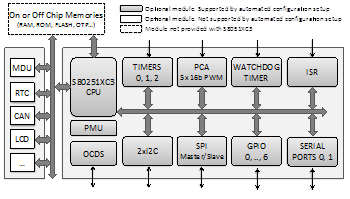| |
Super-Fast, Configurable 16-bit 80251 Microcontroller Core
The S80251XC3 core implements a high-performance 16-bit microcontroller that executes the MCS®251 & MCS®51 instruction sets and includes a configurable range of features and integrated peripherals.
| The core's advanced architecture yields the fastest 8051/80251-compatible MCU available anywhere (at the time of its release). It employs separate instruction and data buses (Harvard architecture), branch prediction, branch target caches, and stacking/un-stacking speed-up features, and is able to execute some instructions in parallel. Dhrystone 2.1 tests show it to run 69.7 times faster than the original 8051 at the same frequency, without requiring an external arithmetic acceleration unit (such as an MDU). Representative 40nm LP ASIC implementations can run with clock frequencies in excess of 300MHz, offering an effective speed up of more than 1,500 times over early 8051 chips. |
|
 |
The S80251XC3 is also extremely energy efficient. Its small silicon footprint—the complete microcontroller (CPU and peripherals) can be under 35,000 gates in size—means there is very little power leakage. Its higher performance compared to other 8-bit or 16-bit MCUs allows clocking at lower frequencies. Users can also adjust the core's energy consumption to match the processing workload via dynamic frequency scaling and independent control of the CPU and peripherals clocks.
The core has a rich set of optional features and pre-integrated peripherals, allowing function, performance, and area to be balanced for each specific application. Software development is facilitated by a single-wire or JTAG debugging interface that operates seamlessly within the ARM® Keil® C251 integrated development environment. Inexpensive debug pods and a complete reference design board package are available.
This 80251 core builds on CAST's experience with hundreds of 8051 IP customers going back to 1997. Designed for easy reuse in ASICs, structured ASICs, or FPGAs, the core is strictly synchronous, with positive-edge clocking (except in the optional debug & SPI modules), synchronous or asynchronous reset, and no internal tri-states.
Applications
The S80251XC3 is a low-power and cost-effective processor that can be used for a variety of tasks, either as a peripheral microcontroller in complex SoCs, or as the main embedded processor in mixed signal ICs.
Peripheral and Options
The S80251XC3 allows the user to easily select among a rich set of pre-integrated and pre-verified peripherals and core configuration options. Simple Verilog defines (e.g. "define USE_PMU") are used for that purpose. The following list summarizes the peripherals and configuration options that are available. Those noted with an asterisk are not included by default with the S80251XC3, but can be added on request.
Timers/Counters
Timer 0 & 1: 80C51-like 16-bit timers/counters
Timer 2: 8052-like 16-bit counter
PCA: 80251-like programmable counter array with five PWM channels
WDT: 80251-like Watchdog Timer
Interfaces
I2C 0 & 1: Master-Slave ports for Phillips Inter-Integrated Circuit (I2C) serial bus
SPI: Master-Slave port for Serial Peripheral bus Interface serial bus
Serial 0: 80C51 or 80251-like Full-Duplex UART/USART
GPIO 0-4: 80C51-like 8-bit Input / Output parallel ports
SFR: Special Function Registers interface
ISR: 80251-like Interrupt Controller with up 23 sources, and two or four priority levels
GPIO 5*: 80C515-like parallel port 5
CAN*: Controller Area Network Bus 2.0 and Flexible Data (FD) Controller
LIN*: Local Interconnect Network Bus Controller
LCD/TFT*: LCD or TFT display controller
OCDS: On-chip debugging system interface
Performance Acceleration & Architectural Options
AIEA: Advanced instruction execution architecture, which includes a number of performance optimizations
VDMA*: Direct Memory Access controller, with up to 8 channels
32MIF: 32-bit memory code/date memory interface
PMU: Power management unit
Deliverables
The core is available in Verilog RTL or as a targeted FPGA netlist. Its deliverables include everything required for a successful implementation, including a behavioral model, an automated constrained random verification (CRV) testbench, comprehensive documentation, and sample synthesis and simulation scripts.
Support
The core as delivered is warranted against defects for ninety days from purchase. Thirty days of phone and email technical support are included, starting with the first interaction. Additional maintenance and support options are available; contact CAST Sales.
|
